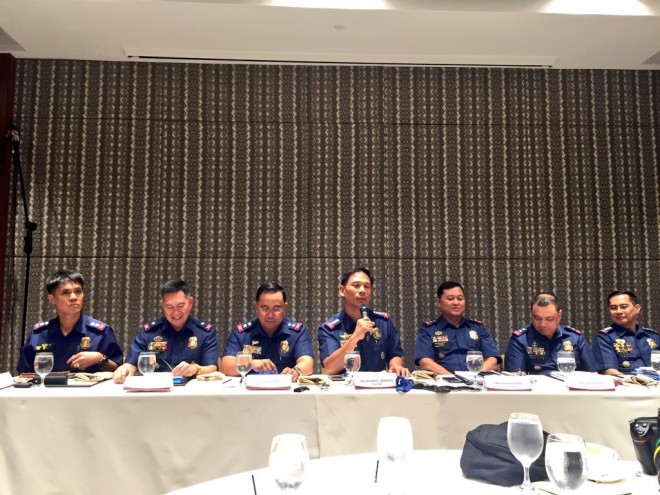
PNP chief Dir. Gen. Ricardo Marquez and heads of the PNP directorial staff discuss challenges in preparing for the election security in 2016. JULLIANE LOVE DE JESUS/INQUIRER.net
The Philippine National Police identified on Tuesday the top six election-watchlist areas (EWAs) in the country that the police are monitoring ahead of the general elections next year.
PNP chief Director General Ricardo Marquez said Pangasinan, Masbate, Negros Oriental, Western Samar, Maguindanao and Lanao del Sur make up the initial list of EWAs the PNP has determined months before the national elections in May 2014.
But Marquez said in a media forum organized by the Foreign Correspondents Association of the Philippines (Focap), the provinces on the list could still change as the PNP, led by the Directorate for Intelligence, continues to monitor the areas prone to election-related crimes.
“The Directorate for Intelligence have collaborated with the Armed Forces of the Philippines to come up with the initial list. But this is still a work in progress as the (current) situation may not be the same situation as tomorrow,” he said.
Parameters
When is an area called an “election hotspot”?
Marquez, joined by the heads of the PNP directorial staff, gave the parameters in identifying EWAs. First, an area should have a history of intense partisan political rivalry.
Second, if there have been incidents in the past that are politically-motivated and election-related.
Marquez discussed the difference between the two. He said politically-motivated incidents are those committed before the campaign period starts while election-related crimes happen during the election period.
Third is the presence of threat groups such as Abu Sayyaf Group, Bangsamoro Islamic Freedom Fighters and private army groups of influential politicians.
The fourth and last parameter is the proliferation of firearms in a certain town, municipality or city.
Categories
In classifying areas as election hotspots, Marquez said the PNP is guided by three categories.
A certain area is under Category 1 if the incidents there are purely political while towns and cities where there are threat groups fall under Category 2.
The last category is the combination of the Category 1 and 2. An area is considered a hotspot if it falls under Category 3.
Marquez said there are 133 areas in Category 1, 54 areas under Category 2 and 99 areas in the last category, which is 17.5 percent of the total number of cities and municipalities nationwide. TVJ
RELATED STORIES
After COC filing, PNP to identify election ‘areas of concern
Comelec urged to place Dumanjug on watchlist